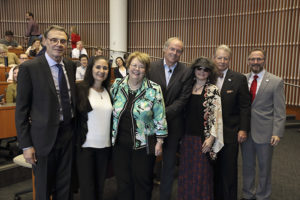Hans Clevers, MD, PhD
2017 Betsy and Stuart Houston Lecture
 The University of Virginia was honored to have Johannes Carolus (Hans) Clevers, a professor in molecular genetics, a geneticist, physician, and medical researcher, present the second annual Betsy and Stuart Houston Lecture, on April 27, 2017. His lecture attracted many and was very well attended, as the entire Medical Education Building Auditorium was full. In addition, a live airing was available to attendees, on screen in a separate area.
The University of Virginia was honored to have Johannes Carolus (Hans) Clevers, a professor in molecular genetics, a geneticist, physician, and medical researcher, present the second annual Betsy and Stuart Houston Lecture, on April 27, 2017. His lecture attracted many and was very well attended, as the entire Medical Education Building Auditorium was full. In addition, a live airing was available to attendees, on screen in a separate area.
Dr. Clevers was the first to identify stem cells in the intestine and is one of the world’s leading researchers on normal stem cells and their potential for regenerative therapy. Clevers obtained his M.D. in 1984 and his Ph.D. in 1985 at Utrecht University. He was a professor in immunology there between 1991 and 2002. He is currently a Professor in Molecular Genetics at the university. The Spinoza Prize was awarded to him in 2001 and he became director of the Hubrecht Institute in 2002. He was elected as the president of the Royal Netherlands Academy of Arts and Sciences (KNAW). Clevers oversees his own research group at the Hubrecht Institute and has been the Director of Research of the Princess Maxima Center for pediatric oncology since June 1, 2015. He was awarded the Breakthrough Prize in Life Sciences for his work in 2013.
Sponsored by the Child Health Research Center, the talk was entitled “Lgr5 stem cell based organoids and their applications in cancer research.” Dr. R. Ariel Gomez, Director of the CHRC, was pleased with the perfected timing of such an endeavor, as a year in advance is often the minimum required time to invite a renowned researcher with the breadth of balancing a schedule of this competence.
Betsy and Stuart Houston provided the monetary gift to endow the second annual Houston Lectureship. Although Betsy Houston, a previous patient of the University of Virginia Medical Center, passed away in 2015, she and her husband provided a contribution prior to her death to support various Medical Center programs. The lectureship gives us the opportunity to invite an outstanding scientist to visit the University each year.
Dr. Clevers spoke to various labs individually during his visit on the morning of his lecture. He also shared his expertise, inviting junior researchers to a luncheon where they had the opportunity to ask questions. We entitled this working lunch, “The Making of a Scientist” and it was fitting, as the caliber of Dr. Clevers’ accomplishments inspire young investigators.
We ended the day with an honorary dinner at the Darden School of Business, which was rich in history, education, and beautifully maintained Jeffersonian architecture. This venue provided the ideal ambiance to pay tribute to Dr. Clevers and his imprint on the University.
Biography
Johannes Carolus (Hans) Clevers (born 27 March 1957) is a professor in molecular genetics, a geneticist, physician, medical researcher who was the first to identify stem cells in the intestine and is one of the world’s leading researchers on normal stem cells and their potential for regenerative therapy.
Hans Clevers obtained his MD degree in 1984 and his PhD degree in 1985 from the University Utrecht, the Netherlands. His postdoctoral work (1986-1989) was done with Cox Terhorst at the Dana-Farber Cancer Institute of the Harvard University, Boston, USA.
From 1991-2002 Hans Clevers was Professor in Immunology at the University Utrecht and, since 2002, Professor in Molecular Genetics. From 2002-2012 he was director of the Hubrecht Institute in Utrecht. From 2012-2015 he was President of the Royal Netherlands Academy of Arts and Sciences (KNAW). Since June 1, 2015 he is director Research of the Princess Maxima Center for pediatric oncology.
Hans Clevers has been a member of the Royal Netherlands Academy of Arts and Sciences since 2000, a member of the American Academy of Arts and Sciences since 2012 and a member of the National Academy of Sciences of the USA since 2014. He is the recipient of several awards, including the Dutch Spinoza Award in 2001, the Swiss Louis Jeantet Prize in 2004, the Memorial Sloan-Kettering Katharine Berkan Judd Award in 2005, the Israeli Rabbi Shai Shacknai Memorial Prize in 2006, the Dutch Josephine Nefkens Prize for Cancer Research and the German Meyenburg Cancer Research Award in 2008, the Dutch Cancer Society Award in 2009, the United European Gastroenterology Federation (UEGF) Research Prize in 2010, the German Ernst Jung-Preis für Medizin in 2011, the French Association pour la Recherche sur le Cancer (ARC) Léopold Griffuel Prize, the Heineken Prize in 2012, the Breakthrough Prize in Life Sciences in 2013, the co-recipient of the 2015 ISSCR McEwen Award for Innovation and the Academy Professor Prize, Kazemi Award for Research Excellence in Bio-Medicine and the Körber European Science Prize in 2016. He obtained two ERC Advanced Investigator grants (2008 and 2016). He is Chevalier de la Legion d’Honneur since 2005 and Knight in the Order of the Netherlands Lion since 2012.
